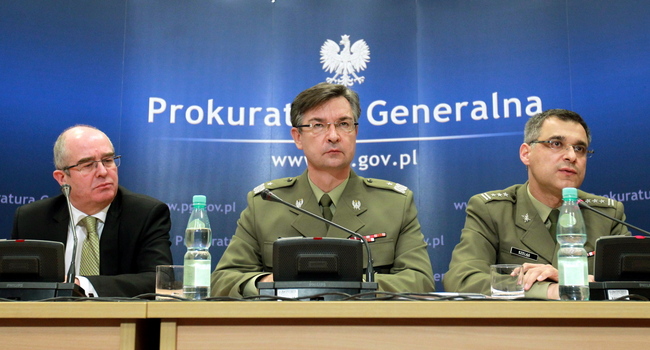
From left to right: Attorney General Andrzej Seremet, Chief Military Prosecutor Krzysztof Parulski and Colonel Ireneusz Szelag, head of the District Military Prosecutors Office in Warsaw: photo - PAP
A voice heard on the black box recording – earlier believed to be that of General Andrzej Blasik, who died with 95 other members of the Polish military and political elite in western Russia – could not be unambiguously identified.
The recordings indicate the voices of 17 people, nine of whom can be identified, not including General Blasik.
The lack of evidence reopens a debate about the real cause of the crash.
Getting to the truth has inevitably become heavily politicised, both within Poland and internationally.
The Law and Justice (PiS) opposition has said the Russian investigation was skewed towards placing the blame on the Polish side, either pilot error and/or pressure from military superiors on the flight to land during heavy fog.
The official Russian investigation into the crash placed much of the blame on General Blasik.
A Polish investigation released seven months later acknowledged a series of errors on the Polish side, but also highlighted grave errors made at the Russian control tower in Smolensk.
Szelag said there were as yet no new hypothesis as to why the plane crashed.
Attorney general Andrzej Seremet said Monday he wants to meet Russian investigators in Warsaw in February and wants to see the flight controller’s flight log and the autopsies of the crash victims.
“We will get some of the Russian documents at the end of January,” he said.
Jaroslaw Kaczynski, head of PiS and twin brother of Lech (the then president), who died in the crash, said the report now puts the onus on the Russian side to reveal all documents related to the crash.
Cabin pressure
Directly after the Smolensk disaster it was speculated that Lech Kaczynski, or someone on his behalf, pressurized the pilot to land, as the president had previous form on this issue.
In August 2008, it was reported that President Kaczynski "shouted furiously" at a pilot who had disobeyed his order to land the presidential plane during a visit to the then war-torn Georgia.
The pilot refused the order of his President as he feared that the airspace over Georgia was not safe from Russian aircraft and landed in a neighbouring country.
President Kaczynski later tried to have the captain removed from his post with the Polish air force for insubordination but was unsuccessful. (jh/pg)